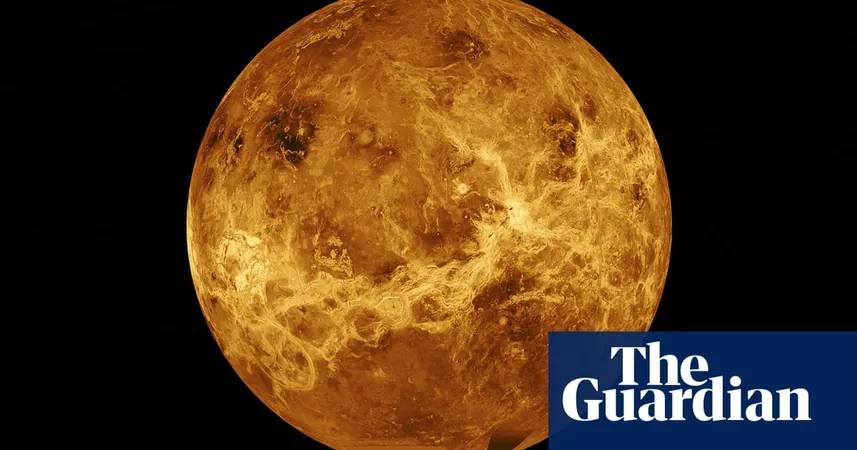
Shocking New Findings Declare Venus Never Hosted Earth-Like Life!
2024-12-02
Author: Ming
Introduction
In a dramatic revelation that challenges long-held beliefs, scientists have declared that Venus, often dubbed Earth’s “evil twin,” has never been the warm, watery haven many once imagined. With scorching surface temperatures capable of melting lead and a toxic atmosphere filled with clouds of sulfuric acid, Venus stands in stark contrast to Earth, despite their similar sizes.
A Shift in Understanding
For decades, some researchers speculated that Venus may have once supported conditions suitable for life, featuring cooler climates and oceans abundant with liquid water. However, groundbreaking atmospheric analysis has cast doubts on this notion, revealing that the planet's interior is remarkably dry, which suggests that it never possessed the extensive oceans traditionally deemed essential for life to emerge.
Expert Insights
“This finding doesn’t entirely rule out the possibility of life, but it definitely rules out Earth-like life,” stated Tereza Constantinou, the lead author of the study from the University of Cambridge. This assertion reignites a fiery debate amongst scientists about whether Venus was ever capable of hosting life or if it has always been the hostile environment we see today.
Historical Context
Historically, the debate has centered on Venus's surface conditions. Some scientists argue that the planet may have been initially more Earth-like before experiencing a catastrophic runaway greenhouse effect, while others maintain that it has always been inhospitable. Constantinou elaborated, explaining that during the early stages of Venus's formation, the planet was engulfed in vast seas of magma. Depending on how quickly this magma cooled, water could have condensed into oceans. However, if cooled slowly, water would have largely converted into steam, escaping into the atmosphere and leaving the planet's interior barren of liquid water.
New Findings
Utilizing data from Venus’s atmosphere, published in the prestigious journal *Nature Astronomy*, Constantinou and her team conducted an in-depth analysis that highlighted the unchanging nature of the planet’s atmospheric components. This stability indicated that the rate at which volcanic emissions occur is balanced by the rate of their replenishment. The kicker? Their findings revealed that volcanic activity on Venus is 'dry,' emitting minimal water vapor, which implies a similarly arid condition within the planet itself.
Implications for Future Research
“The lack of water in volcanic eruptions points to an equally dry interior of Venus,” Constantinou noted, ruling out the likelihood that Venus once had surface oceans or a climate conducive to habitability.
Looking Ahead
Excitingly, the implications of these findings could be put to the test in the near future. NASA is planning to launch the DaVinci mission later this decade, which will conduct flybys of Venus and deploy a surface probe to gather more data.
Conclusion
Understanding Venus’s dramatic transformation could offer astronomers invaluable clues about the evolution of habitability, not only within our solar system but also beyond. “The dynamics between Earth and Venus serve as a natural laboratory for studying how conditions for life can change over time,” Constantinou remarked, highlighting the significance of continued exploration.
Final Thoughts
With further exploration on the horizon, the question remains: Could Venus's secrets hold the key to discovering habitable planets elsewhere in the universe? The thrilling quest to uncover the truth about our planetary neighbor is just beginning!


 Brasil (PT)
Brasil (PT)
 Canada (EN)
Canada (EN)
 Chile (ES)
Chile (ES)
 España (ES)
España (ES)
 France (FR)
France (FR)
 Hong Kong (EN)
Hong Kong (EN)
 Italia (IT)
Italia (IT)
 日本 (JA)
日本 (JA)
 Magyarország (HU)
Magyarország (HU)
 Norge (NO)
Norge (NO)
 Polska (PL)
Polska (PL)
 Schweiz (DE)
Schweiz (DE)
 Singapore (EN)
Singapore (EN)
 Sverige (SV)
Sverige (SV)
 Suomi (FI)
Suomi (FI)
 Türkiye (TR)
Türkiye (TR)